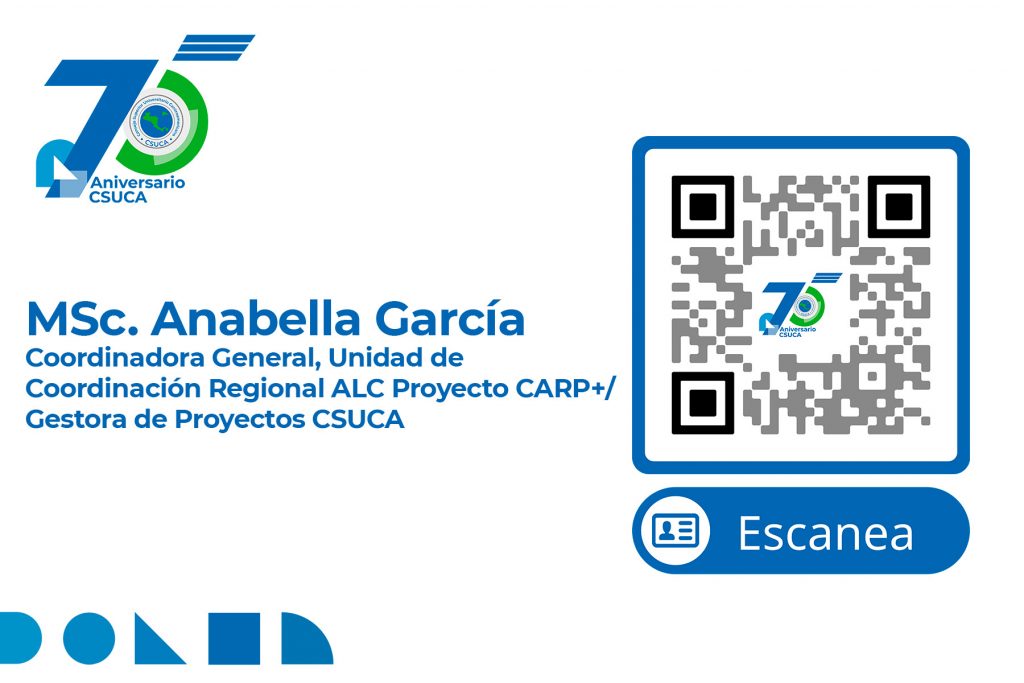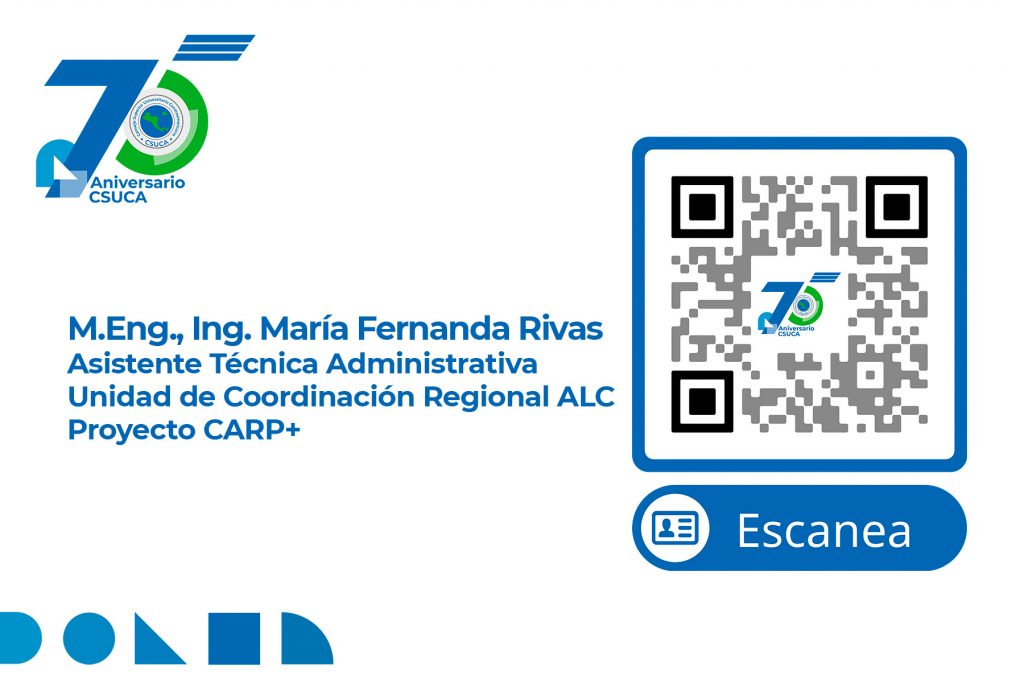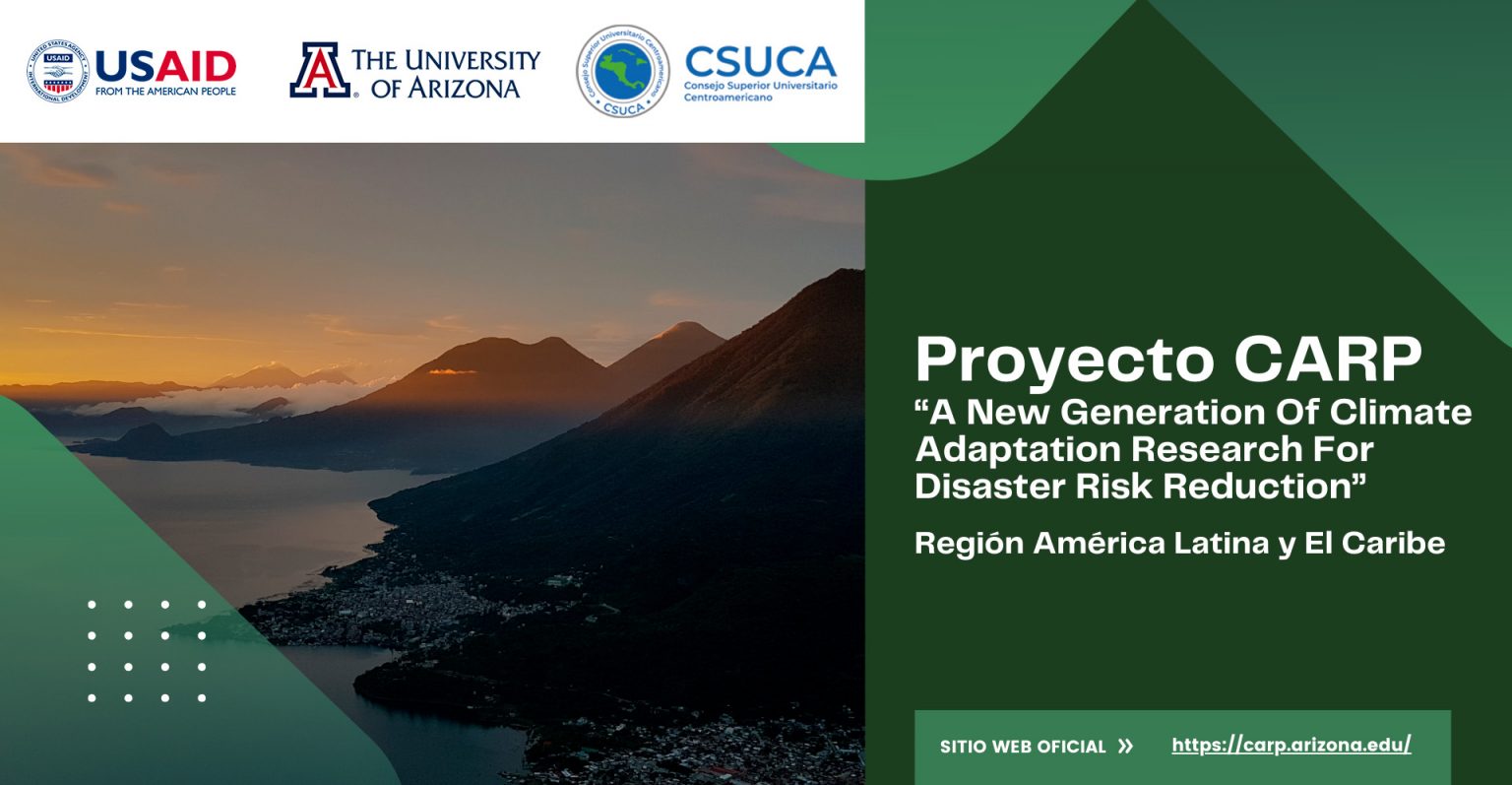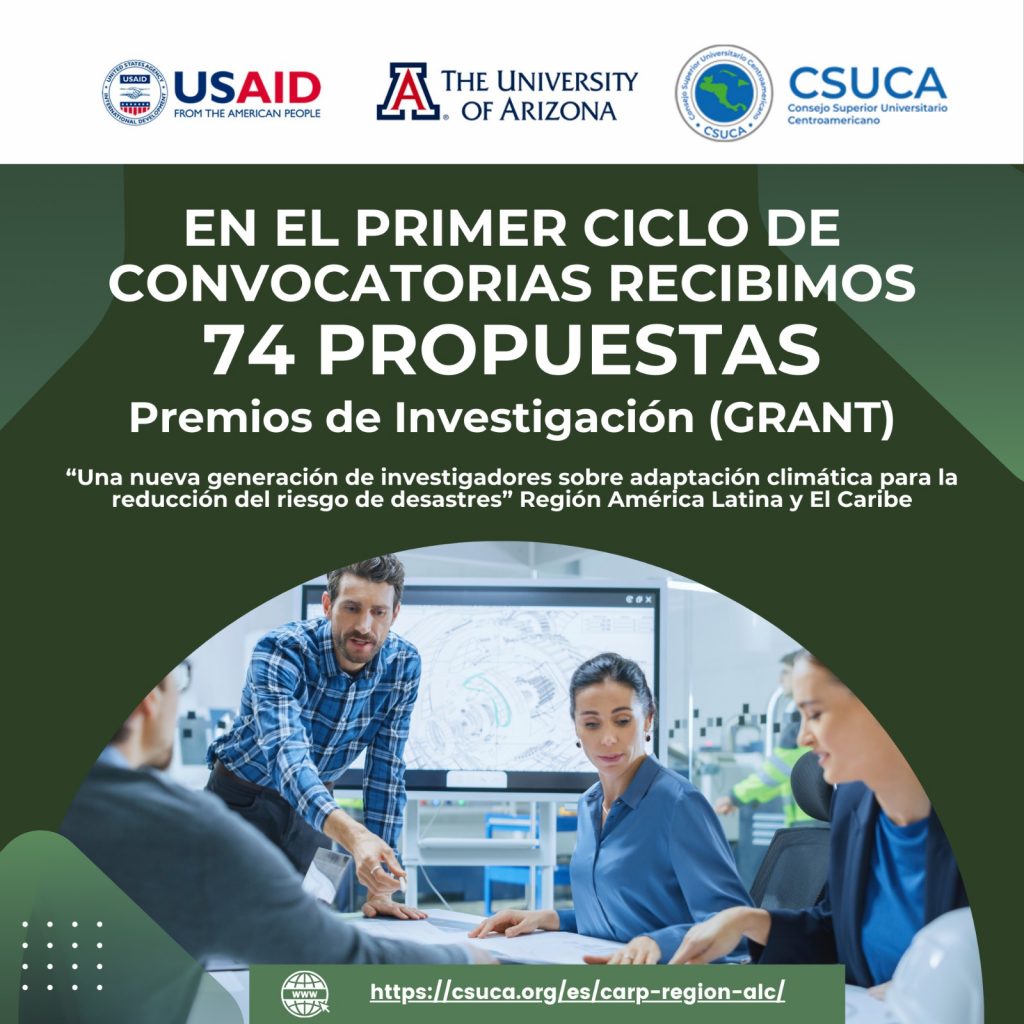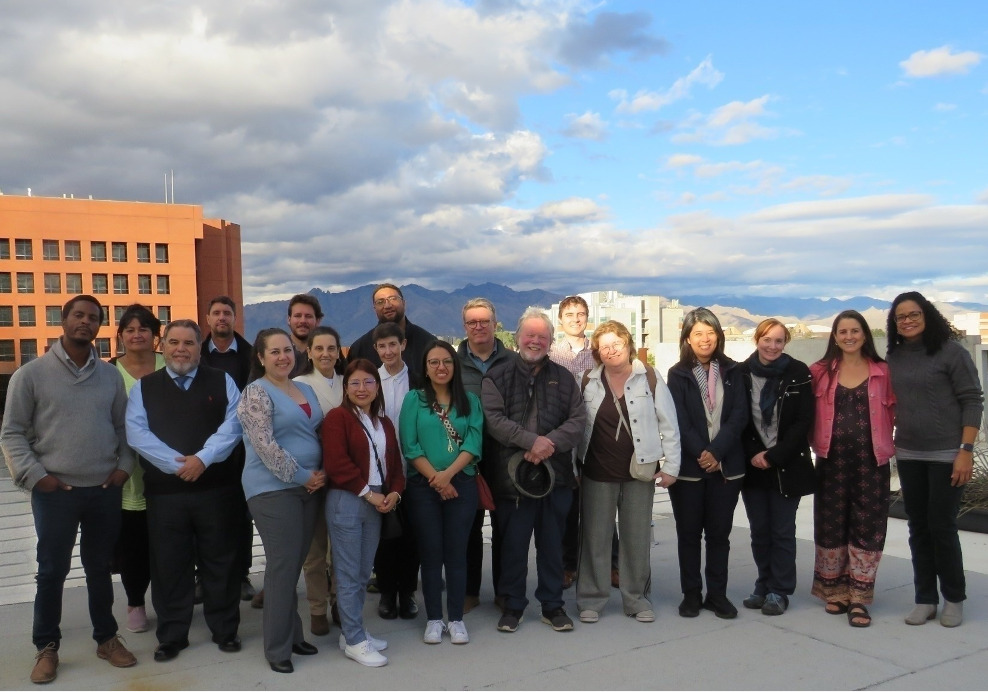UNA NUEVA GENERACIÓN DE INVESTIGADORES SOBRE ADAPTACIÓN CLIMÁTICA PARA LA REDUCCIÓN DEL RIESGO DE DESASTRES
Centroamérica es una de las regiones más vulnerables y afectadas por fenómenos naturales y, a pesar de ser una región poco significativa en la emisión global de gases de efecto invernadero y cambio climático, el impacto que se genera en la región es catastrófico, afectando principalmente a las personas más desfavorecidas, la infraestructura, vivienda, agricultura e interrupción de los servicios básicos. Huracanes, fuertes precipitaciones, deslizamientos que arrastran poblaciones, sequías o inundaciones que condenan la agricultura; esa variabilidad climática a la que se suman factores de vulnerabilidad y pobreza, son los principales desafíos de América Latina y El Caribe, según lo advierte el climatólogo peruano José Antonio Marengo, autor principal del estudio Estado del Clima en América Latina y El Caribe de la Organización Meteorológica Mundial -OMM- (Marengo, 2022).
Por tal motivo, se reconoce la necesidad de apoyar una nueva generación de investigadores jóvenes y de carrera temprana de las universidades de la región centroamericana, El Caribe y Sur América, creando grupos dinámicos de investigación universitaria sobre adaptación al cambio climático y reducción de riesgo y desastres que fomenten comunidades regionales de académicos, profesionales y legisladores que puedan intercambiar experiencias, conocimientos y éxitos entre sí con la finalidad de generar soluciones para beneficio de la sociedad.
Y es así como surge el Proyecto CARP+ “A New Generation Of Climate Adaptation Research For Disaster Risk Reduction” (Una nueva Generación de investigadores para la reducción del riesgo de desastres y cambio climático, en su traducción al español) el cual pretende fortalecer la planificación y preparación ante desastres a través de investigaciones aplicadas y localizadas en adaptación climática y reducción del riesgo de desastres en el Sur Global. Este proyecto crea un Programa de Investigación para la Adaptación Climática (CARP por sus siglas en inglés) que apoya a científicos jóvenes y en las primeras etapas de sus carreras, para la investigación sobre adaptación climática y reducción de riesgo de desastres en las regiones de África, América Latina y el Caribe, el Pacífico Occidental y las Islas del Pacífico.
Por lo que del 22 al 26 de enero se llevó a cabo en la Universidad de Arizona una reunión con los integrantes del programa CARP+ con el objetivo de establecer una visión común de trabajo para todas las regiones, identificar las prioridades ampliadas de los premios de investigación que serán otorgados, aclarar el enfoque de coordinación y los detalles de la gestión del proyecto, para revisar las expectativas de cada uno de los integrantes del equipo y los objetivos colectivos y realizar una planificación conjunta acerca de cómo abordar los desafíos centrales que se presenten en la implementación del mismo.
El programa está diseñado para involucrar a actores relevantes para la asistencia humanitaria y la reducción del riesgo de desastres, así como personas tomadoras de decisión, en el proceso de investigación y las actividades de diseminación. Al promover esta forma colaborativa de investigación, se espera generar evidencia relevante y resultados de investigación aplicada que contribuyan a generar información para las agencias locales de reducción de riesgo de desastres y a construir estrategias de resiliencia para la mitigación y reducción de vulnerabilidades.
El proyecto CARP+ está siendo implementado por la Universidad de Arizona, en conjunto con socios regionales para el involucramiento de 55 países, instituciones de educación superior y/o redes de instituciones de educación superior. Los fondos para el proyecto han sido concedidos por la Agencia de los Estados Unidos para el Desarrollo Internacional (USAID por sus siglas en inglés).
El Consejo Superior Universitario Centroamericano (CSUCA), como autoridad máxima de la Confederación Universitaria Centroamericana, tiene a su cargo la Unidad de Coordinación Regional (UCR) para América Latina y el Caribe, con el propósito de administrar los fondos regionales para apoyar la investigación sobre la adaptación al cambio climático y la reducción del riesgo de desastres.
El CSUCA coordina y articula entre las universidades miembro, los 08 sistemas regionales que lo conforman y los 07 programas estipulados en el Quinto Plan para la Integración Regional de la Educación Superior de Centroamérica y República Dominicana (PIRESC V), aprobado en el IX Congreso Universitario Centroamericano, llevado a cabo en el año 2021, que constituye el plan de trabajo de la institución para los próximos 10 años.
En ese sentido, este proyecto se apoya en el Programa: Investigación, Ciencia, Tecnología e Innovación para la Integración y el Desarrollo Regional, ejecutado por el Sistema Regional Centroamericano y del Caribe de Investigación y Posgrado (SIRCIP); estipulado en el Quinto Plan para la Integración Regional de la Educación Superior de Centroamérica y República Dominicana (PIRESC V), aprobado en el IX Congreso Universitario Centroamericano, llevado a cabo en el año 2021.
El cual según su naturaleza vela por el fortalecimiento, orientación, apoyo, coordinación, armonización e integración de la investigación y los estudios de postgrado, con enfoque regional. Así también, en la Política Universitaria Centroamericana para la Reducción del Riesgo de Desastres (PUCARRD), la cual responde al compromiso manifestado por las universidades (Francisco Alarcón, 2017), entre otros.
La Unidad de Coordinación de Regional que coordina el CSUCA, trabajará de la mano con la Unidad de Coordinación de Programas (PCU) en la Universidad de Arizona, quienes se encargan de supervisar la gestión de los fondos, promover las actividades de la comunidad global CARP+, brindar apoyo a las regiones en sociedad y trabajar para ampliar las redes universitarias, profesionales y legisladores.
In accordance with the main objectives of the CARP+ strategy, at the regional level it is intended to obtain the following results:
1. Diagnóstico institucional para identificar si las universidades participantes cuentan con Institutos de Investigación y cuál es su capacidad técnica.
2. Redes de intercambio y colaboración científica creadas y/o fortalecidas en los países que integran el CSUCA, con participación de otros países de América Latina, considerando las prioridades de la región.
3. Fondos asignados para apoyar proyectos de una nueva generación de investigadores jóvenes y de carrera temprana en universidades de América Latina y de El Caribe, en torno a los temas de adaptación al cambio climático relacionados con la reducción del riesgo de desastres.
4. Producir resultados de investigación aplicados que se centren en la resolución de problemas en torno a la adaptación al cambio climático y reducción de riesgo de desastres y que puedan estar a la disposición de los tomadores de decisiones nacionales y locales.
Para dar cumplimiento a dichos resultados el Proyecto CARP+, a través de la UCR para América Latina se otorgarán en un periodo de 5 años 90 premios de forma competitiva a proyectos de investigación aplicada correspondientes a investigadores de carrera temprana con un premio de hasta $10,000.00 por proyecto a desarrollarse en un máximo de 12 meses. (Personal de investigación de carrera temprana se refiere a profesionales dentro de los 7 años posteriores a la obtención de su título más alto a nivel de maestría y/o doctorado); y 6 premios de hasta $70,000 para proyectos que conformen redes de colaboración en investigación aplicada, los cuales contarán con una duración máxima de ejecución de 2 años, y deberán ser integrados por un mínimo de tres instituciones de educación superior de tres países diferentes de la región de América Latina y el Caribe.
Para ambas modalidades, las investigaciones con el apoyo de estas Becas Premio tendrán la oportunidad de compartir sus hallazgos y retos con la comunidad global CARP, teniendo acceso a personas expertas de todas las regiones participantes, afianzando la colaboración Sur-Sur y desarrollando nuevas soluciones para las problemáticas locales de sus comunidades.
Documents of Interest
PRESENTACIONES:
Evento de Lanzamiento Proyecto “UNA NUEVA GENERACIÓN DE INVESTIGADORES SOBRE ADAPTACIÓN CLIMÁTICA PARA LA REDUCCIÓN DEL RIESGO DE DESASTRES” (CARP, por sus siglas en inglés) Región Latinoamérica y el Caribe, 23 y 24 de mayo de 2024.
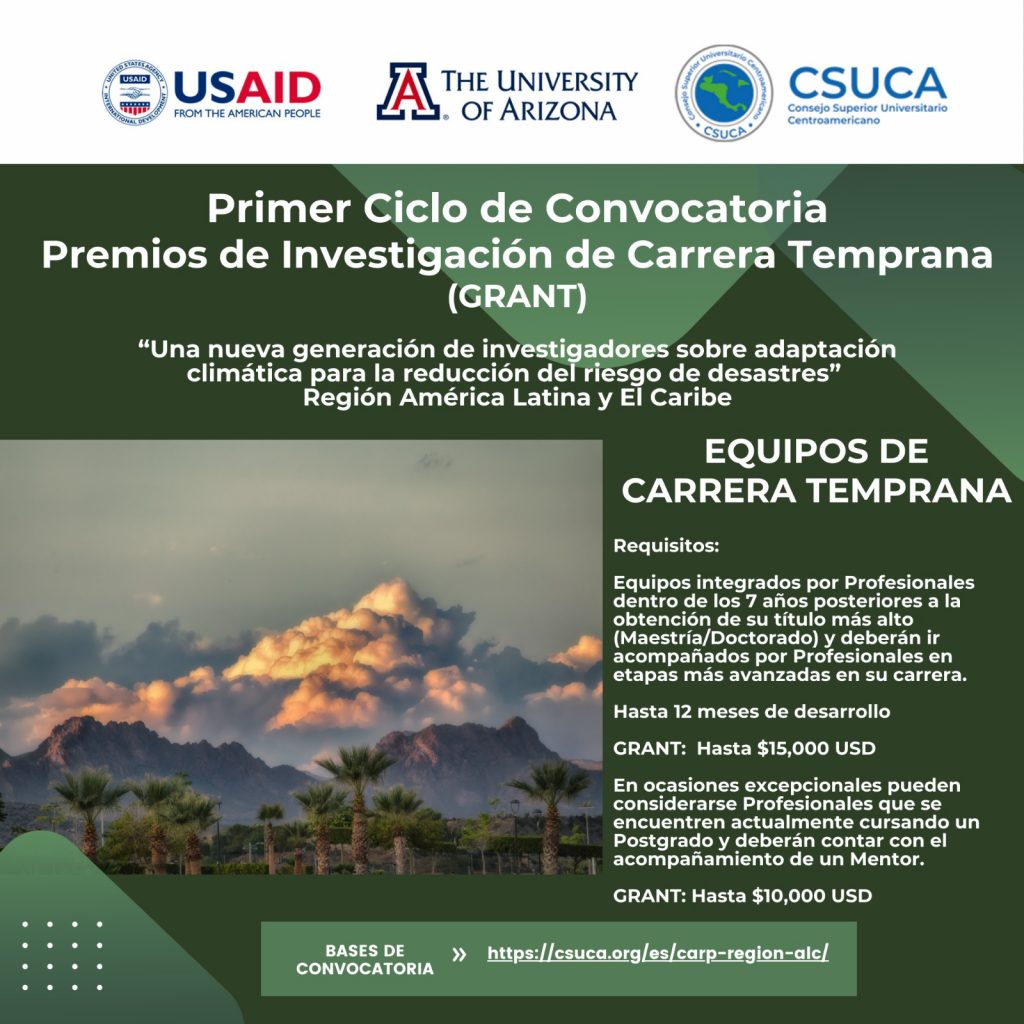
Convocatoria GRANT (Premios) de Investigación de Carrera Temprana
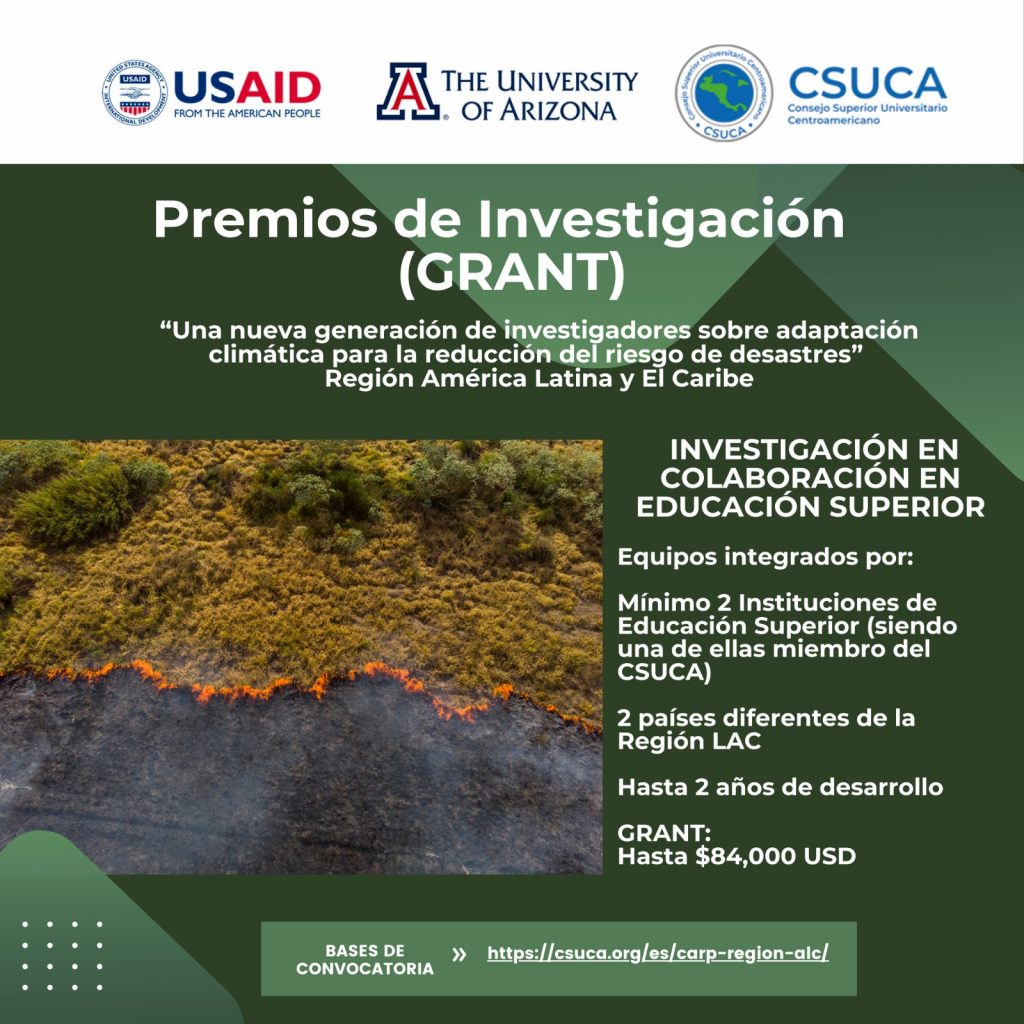
Convocatoria GRANT (Premios) de Investigación Consorcios
Resumen Proyecto
Contacto Unidad Ejecutora
